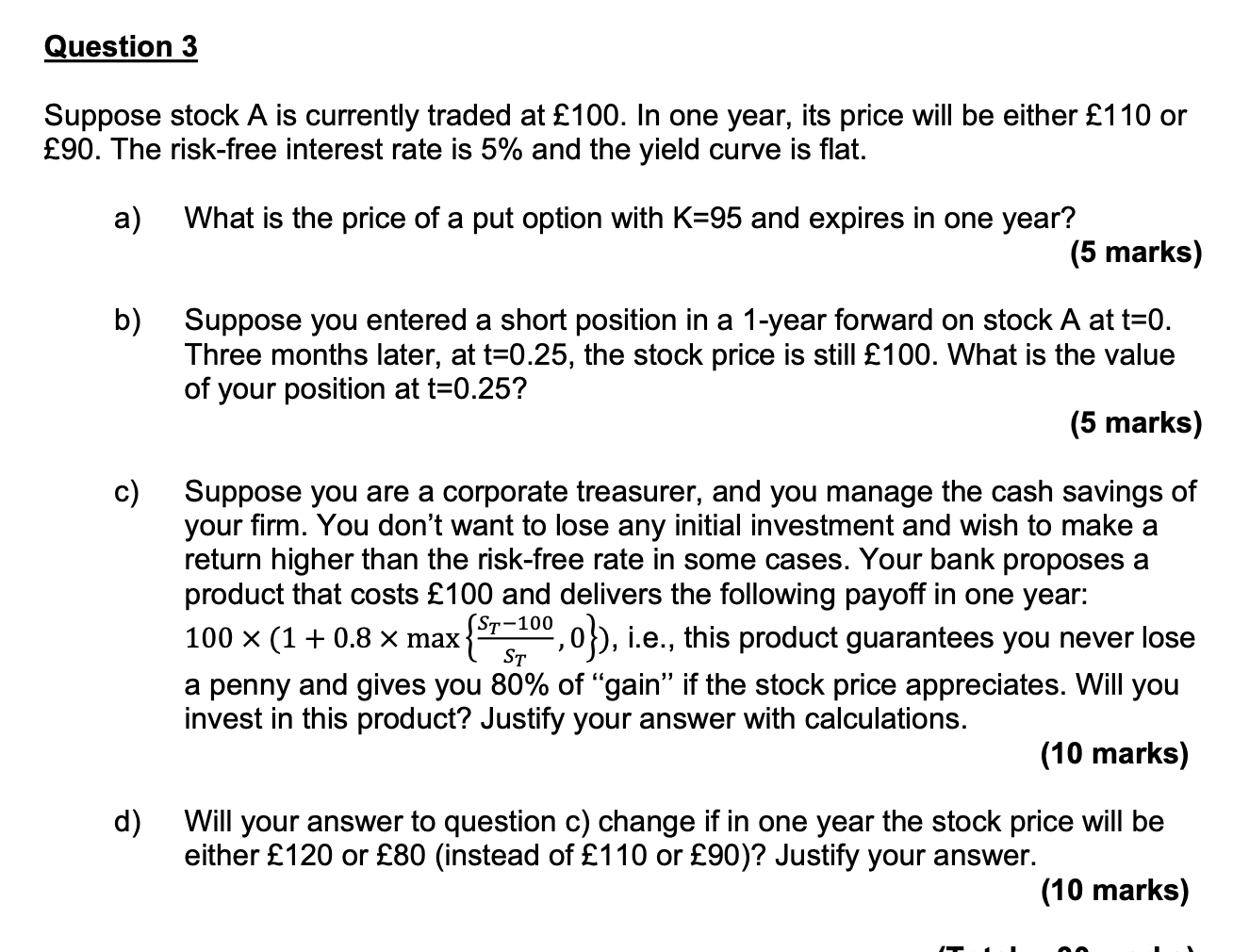Other questions asked by students
Medical Sciences
Biology
Electrical Engineering
Accounting
Accounting
 Suppose stock \\( A \\) is currently traded at \\( 100 \\). In one year, its price will be either \\( 110 \\) or f90. The risk-free interest rate is \5 and the yield curve is flat. a) What is the price of a put option with \\( \\mathrm{K}=95 \\) and expires in one year? (5 marks) b) Suppose you entered a short position in a 1-year forward on stock \\( A \\) at \\( t=0 \\). Three months later, at \\( t=0.25 \\), the stock price is still \\( 100 \\). What is the value of your position at \\( \\mathrm{t}=0.25 \\) ? (5 marks) c) Suppose you are a corporate treasurer, and you manage the cash savings of your firm. You don't want to lose any initial investment and wish to make a return higher than the risk-free rate in some cases. Your bank proposes a product that costs \\( 100 \\) and delivers the following payoff in one year: \\( 100 \\times\\left(1+0.8 \\times \\max \\left\\{\\frac{s_{T}-100}{s_{T}}, 0\ ight\\}\ ight) \\), i.e., this product guarantees you never lose a penny and gives you \80 of \"gain\" if the stock price appreciates. Will you invest in this product? Justify your answer with calculations. (10 marks) d) Will your answer to question c) change if in one year the stock price will be either \\( 120 \\) or \\( 80 \\) (instead of \\( 110 \\) or \\( 90 \\) )? Justify your answer. (10 marks) Suppose stock \\( A \\) is currently traded at \\( 100 \\). In one year, its price will be either \\( 110 \\) or f90. The risk-free interest rate is \5 and the yield curve is flat. a) What is the price of a put option with \\( \\mathrm{K}=95 \\) and expires in one year? (5 marks) b) Suppose you entered a short position in a 1-year forward on stock \\( A \\) at \\( t=0 \\). Three months later, at \\( t=0.25 \\), the stock price is still \\( 100 \\). What is the value of your position at \\( \\mathrm{t}=0.25 \\) ? (5 marks) c) Suppose you are a corporate treasurer, and you manage the cash savings of your firm. You don't want to lose any initial investment and wish to make a return higher than the risk-free rate in some cases. Your bank proposes a product that costs \\( 100 \\) and delivers the following payoff in one year: \\( 100 \\times\\left(1+0.8 \\times \\max \\left\\{\\frac{s_{T}-100}{s_{T}}, 0\ ight\\}\ ight) \\), i.e., this product guarantees you never lose a penny and gives you \80 of \"gain\" if the stock price appreciates. Will you invest in this product? Justify your answer with calculations. (10 marks) d) Will your answer to question c) change if in one year the stock price will be either \\( 120 \\) or \\( 80 \\) (instead of \\( 110 \\) or \\( 90 \\) )? Justify your answer. (10 marks)
Suppose stock \\( A \\) is currently traded at \\( 100 \\). In one year, its price will be either \\( 110 \\) or f90. The risk-free interest rate is \5 and the yield curve is flat. a) What is the price of a put option with \\( \\mathrm{K}=95 \\) and expires in one year? (5 marks) b) Suppose you entered a short position in a 1-year forward on stock \\( A \\) at \\( t=0 \\). Three months later, at \\( t=0.25 \\), the stock price is still \\( 100 \\). What is the value of your position at \\( \\mathrm{t}=0.25 \\) ? (5 marks) c) Suppose you are a corporate treasurer, and you manage the cash savings of your firm. You don't want to lose any initial investment and wish to make a return higher than the risk-free rate in some cases. Your bank proposes a product that costs \\( 100 \\) and delivers the following payoff in one year: \\( 100 \\times\\left(1+0.8 \\times \\max \\left\\{\\frac{s_{T}-100}{s_{T}}, 0\ ight\\}\ ight) \\), i.e., this product guarantees you never lose a penny and gives you \80 of \"gain\" if the stock price appreciates. Will you invest in this product? Justify your answer with calculations. (10 marks) d) Will your answer to question c) change if in one year the stock price will be either \\( 120 \\) or \\( 80 \\) (instead of \\( 110 \\) or \\( 90 \\) )? Justify your answer. (10 marks) Suppose stock \\( A \\) is currently traded at \\( 100 \\). In one year, its price will be either \\( 110 \\) or f90. The risk-free interest rate is \5 and the yield curve is flat. a) What is the price of a put option with \\( \\mathrm{K}=95 \\) and expires in one year? (5 marks) b) Suppose you entered a short position in a 1-year forward on stock \\( A \\) at \\( t=0 \\). Three months later, at \\( t=0.25 \\), the stock price is still \\( 100 \\). What is the value of your position at \\( \\mathrm{t}=0.25 \\) ? (5 marks) c) Suppose you are a corporate treasurer, and you manage the cash savings of your firm. You don't want to lose any initial investment and wish to make a return higher than the risk-free rate in some cases. Your bank proposes a product that costs \\( 100 \\) and delivers the following payoff in one year: \\( 100 \\times\\left(1+0.8 \\times \\max \\left\\{\\frac{s_{T}-100}{s_{T}}, 0\ ight\\}\ ight) \\), i.e., this product guarantees you never lose a penny and gives you \80 of \"gain\" if the stock price appreciates. Will you invest in this product? Justify your answer with calculations. (10 marks) d) Will your answer to question c) change if in one year the stock price will be either \\( 120 \\) or \\( 80 \\) (instead of \\( 110 \\) or \\( 90 \\) )? Justify your answer. (10 marks) 